White Vinegar Carpet Cleaning Secrets Revealed
The Versatility of White Vinegar in Carpet Cleaning
White vinegar, a common household item, is a powerhouse for carpet cleaning, offering a safe, natural, and cost-effective alternative to commercial cleaners. Its acidic nature makes it excellent for breaking down dirt, grime, and odours, rejuvenating carpets without the use of harsh chemicals.
Vinegar's effectiveness in cleaning stems from its ability to dissolve residues, neutralize odours, and act as a mild disinfectant. This makes it particularly useful for tackling common carpet issues such as food and drink spills, pet stains, and general odours. For everyday cleaning, a solution of equal parts white vinegar and water can be used. This mixture can be sprayed directly onto carpets, or used in a carpet cleaning machine as a rinse agent.
When it comes to removing stains, vinegar works best when applied directly to the stain and left to soak for several minutes before blotting with a clean, dry cloth. For tougher stains, a paste made from vinegar and baking soda can be applied to the carpet, allowed to dry, and then vacuumed up, lifting the stain in the process.
One of the greatest benefits of using white vinegar for carpet cleaning is its safety profile. Unlike many commercial carpet cleaners, vinegar does not leave behind potentially harmful residues, making it a safe choice for households with children and pets. However, it's always recommended to conduct a patch test on a small, inconspicuous area of the carpet to ensure colour-fastness and material compatibility.
In summary, white vinegar is an effective, eco-friendly, and economical solution for various carpet cleaning needs. Its versatility in dealing with different types of carpet stains and odours makes it a valuable tool in any homeowner's cleaning arsenal.
Browse Some Recommended DIY Home Remedies
Combining Baking Soda and Vinegar for Effective Carpet Cleaning
The combination of baking soda and vinegar is a potent natural solution for deep cleaning carpets. This duo works synergistically, harnessing the abrasive properties of baking soda and the acidic nature of vinegar to tackle a range of carpet issues, from stains to odours.
To use baking soda and vinegar for carpet cleaning, start by sprinkling a generous amount of baking soda over the stained or odorous area. Baking soda is a natural deodorizer and gentle abrasive, making it effective in absorbing odours and loosening stains. After applying the baking soda, mix equal parts white vinegar and water in a spray bottle and lightly mist over the baking soda.
The resulting reaction produces carbon dioxide, which creates a fizzing action that helps to lift dirt and stains from the carpet fibres.
This method is particularly effective for removing tough stains like pet urine. The vinegar works to neutralize the ammonia in urine, eliminating the smell, while the baking soda lifts the stain. For best results, allow the baking soda and vinegar mixture to sit on the carpet for several minutes before blotting it up with a clean cloth.
When using vinegar and baking soda, it's important to ensure that the carpet is not overly saturated, as excessive moisture can seep into the carpet padding and lead to mould growth. After cleaning, thoroughly dry the area, either by blotting with towels or using fans to speed up the drying process.
While this combination is generally safe for most carpet types, it's always advisable to do a spot test in an inconspicuous area to ensure that the carpet's colour and texture are not adversely affected.
Incorporating this natural cleaning method into your carpet care routine can help maintain your carpets' appearance and extend their lifespan.
Special Care for Delicate and Oriental Rugs
When it comes to delicate and oriental rugs, using white vinegar for cleaning requires a gentle and informed approach. These rugs, often made of natural fibres and featuring intricate designs, can be sensitive to harsh chemicals and improper cleaning methods.
For oriental rugs, a diluted vinegar solution is typically safe and can be effective for removing light stains and odours. Mix one part white vinegar with three parts water to create a gentle cleaning solution. Before applying it to the entire rug, it’s crucial to conduct a spot test on a small, inconspicuous area to check for colour-fastness and any potential damage to the fibres.
For deeper cleaning or stubborn stains, it’s advisable to seek professional cleaning services, especially for high-value oriental rugs. Professionals have the expertise and equipment to clean these delicate items without causing harm.
In addressing concerns like whether vinegar is safe for Persian rugs or if it will discolour or damage wool rugs, it's important to remember that moderation is key. While vinegar can be a useful cleaning agent, its acidic nature means it should be used cautiously, particularly on delicate rugs. If in doubt, consulting a professional or opting for a specialized rug cleaning product is a safer choice.
When cleaning oriental rugs at home, it’s also important to consider the drying process. After using any cleaning solution, including vinegar, ensure the rug is thoroughly dried in a well-ventilated area to prevent moisture build-up, which can lead to mould and mildew growth.
When Not to Use Vinegar and Alternative Solutions
While white vinegar is a versatile and effective cleaning agent for many types of carpets, there are situations where its use may not be appropriate. Understanding when not to use vinegar and exploring alternative cleaning solutions can ensure the best care for your carpets.
Vinegar should be used cautiously on carpets made of delicate fibres such as silk or antique textiles. Its acidic nature can potentially damage these materials. For such delicate carpets, mild detergent solutions or specialized carpet cleaning products are safer alternatives.
In cases where vinegar’s odour is undesirable or where its cleaning efficacy may be limited, other natural solutions can be employed. For instance, club soda can be effective in lifting fresh stains, while cornstarch is useful in absorbing grease and oil stains. Hydrogen peroxide, used carefully, can address tougher stains, but it’s important to test for colour-fastness first.
When dealing with specific challenges like removing dried dog pee without vinegar, enzymatic cleaners can be a more suitable choice. These cleaners break down the urine at a molecular level, eliminating odours and stains without the need for vinegar.
Additionally, it’s worth noting that vinegar might not be the best option for cleaning wool rugs. The acidic nature of vinegar can break down the natural oils in wool, leading to damage over time. Instead, wool carpets can be cleaned with wool-safe detergents and cool water.
The question of how long to let vinegar sit on carpet depends on the type of stain and the carpet’s material. Typically, a few minutes is sufficient for light stains, but it should be promptly blotted up, and the area dried thoroughly to prevent any potential water damage.
Understanding the limitations of vinegar and having a range of alternative cleaning solutions at hand can help in maintaining the beauty and longevity of various types of carpets and rugs.
Cleaning Methods
Advanced Carpet Maintenance Strategies
Advanced carpet maintenance goes beyond regular cleaning and involves strategies that ensure the longevity and durability of your carpets. Using steam cleaners for carpets is a highly effective method for deep cleaning and sanitizing. This section provides in-depth information on how to use these tools effectively, along with tips and tricks for keeping your carpets looking and feeling new.
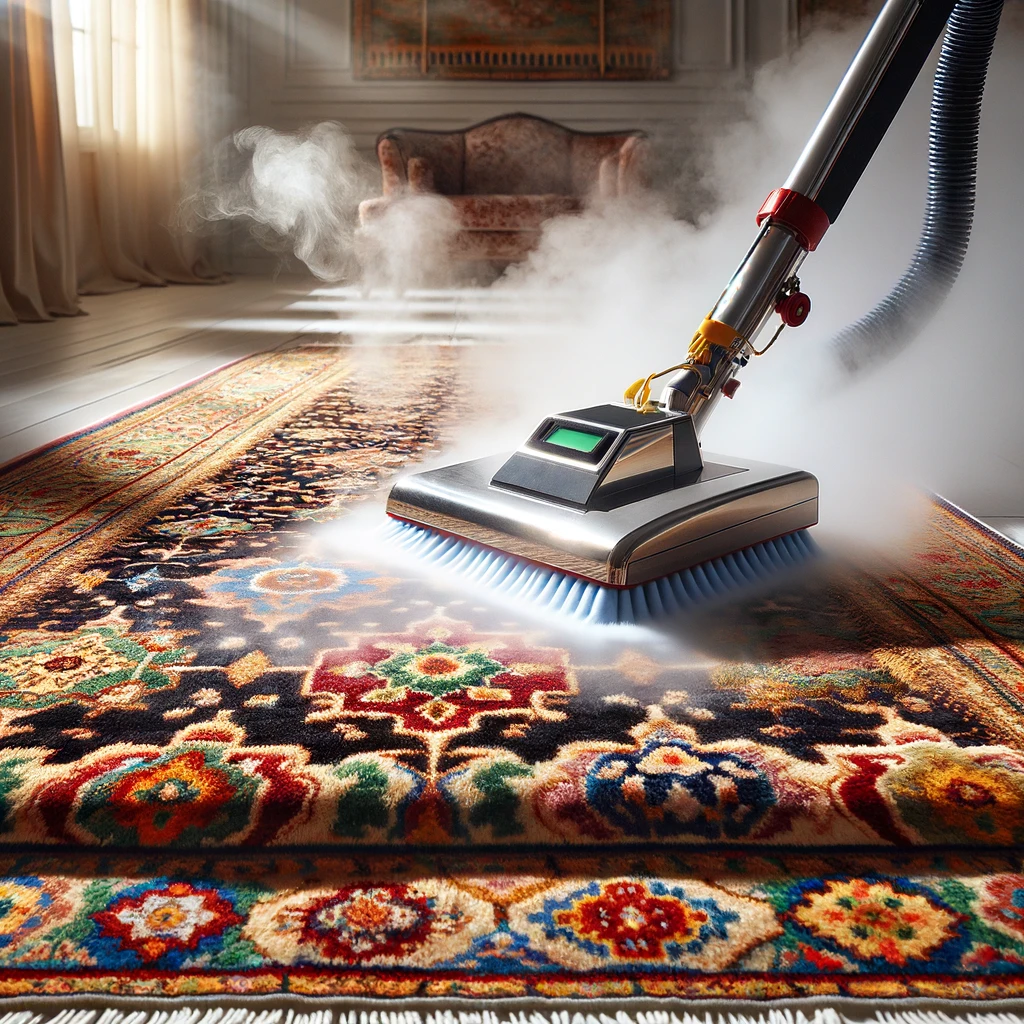
Steam Cleaning
Steam cleaning for Persian rugs involves a gentle yet effective method of deep cleaning, removing dirt and allergens without damaging delicate fibers, preserving beauty and longevity.
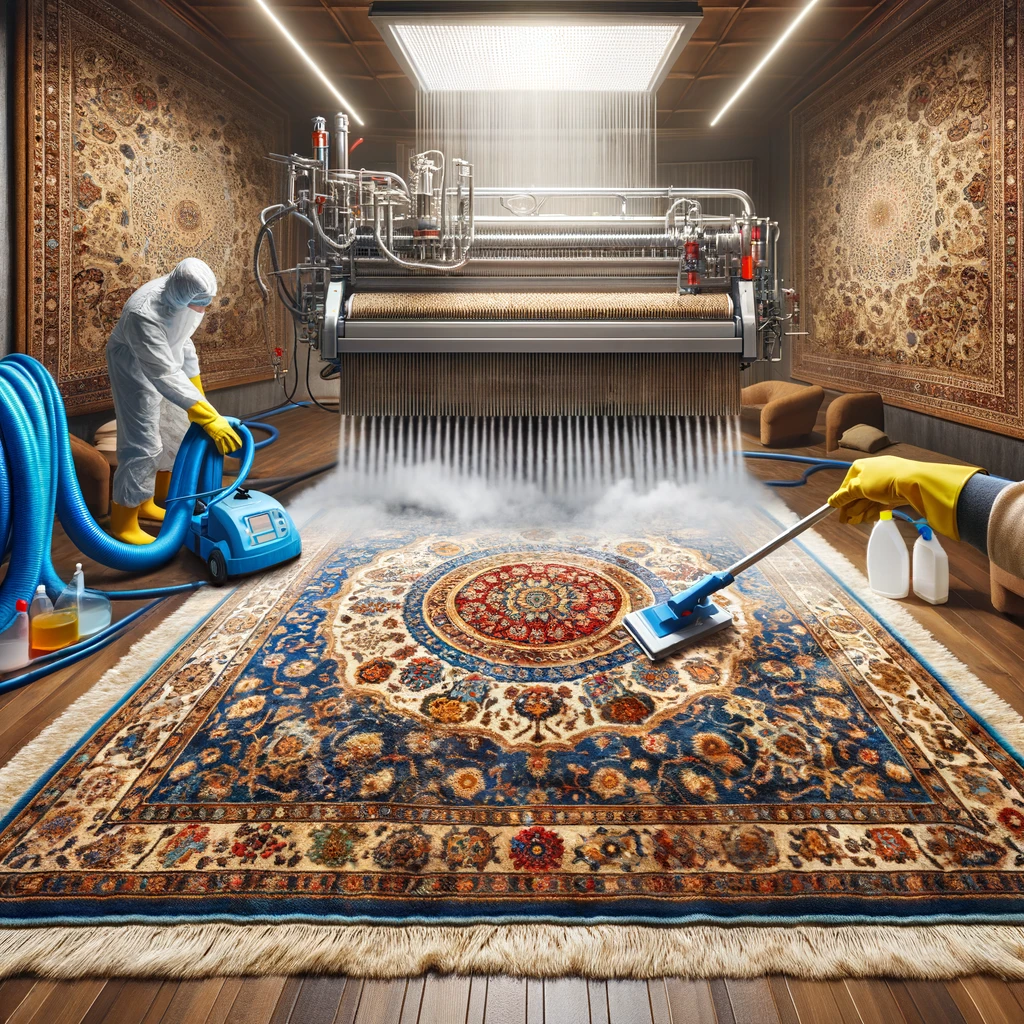
Deep Cleaning
Deep cleaning Persian rugs requires specialized techniques to remove deeply embedded dirt and restore their vibrant colors, ensuring the preservation of their intricate designs and durability.
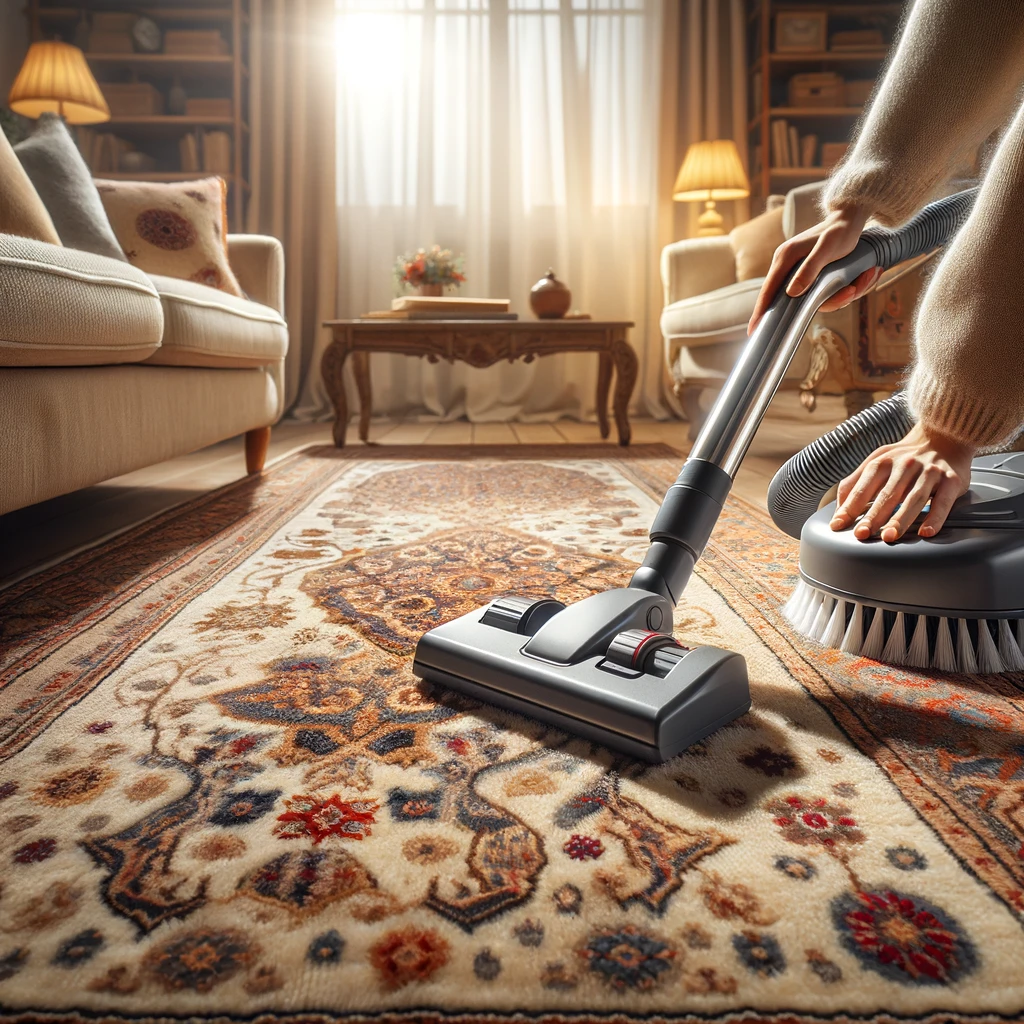
Vacuum Cleaning
Vacuum cleaning for Persian rugs focuses on removing surface dust and debris gently, protecting the rug's intricate patterns and delicate fibers from wear and damage.

Stain Removal
Stain removal for Persian rugs addresses common damage issues like spills and spots, using careful techniques to preserve colors and fibers while eliminating blemishes.
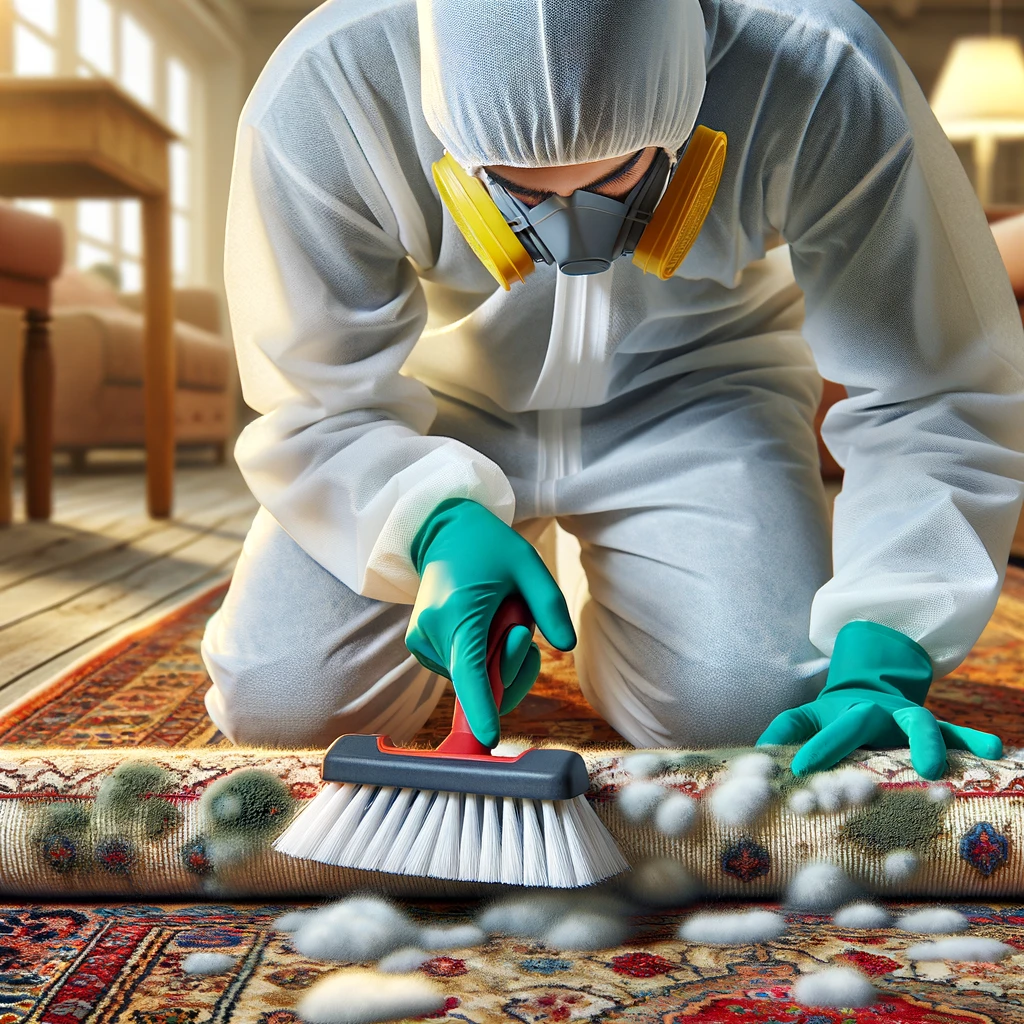
Mold Removal
Mold removal for Persian rugs tackles common damage issues such as mildew and fungus, employing safe methods to eradicate growth and restore rug health without harm.
Specialized Carpet Treatments: Moths, Fleas, and More
Tackling Carpet Moths and Fleas
Carpet moths and fleas can be a significant nuisance, damaging the fibers and reducing the lifespan of your carpets. Effective carpet moth treatment involves not just the use of specific insecticidal products but also a thorough understanding of these pests. Regularly inspecting your rugs and carpets for signs of infestation and implementing preventive measures are key to controlling these pests.
Flea powder for carpets is another important aspect of specialized carpet care, especially for pet owners. Choosing the right product and understanding how to apply it effectively is crucial in maintaining a hygienic environment. This section also covers how to keep your rugs clean and pest-free in a safe and effective manner.
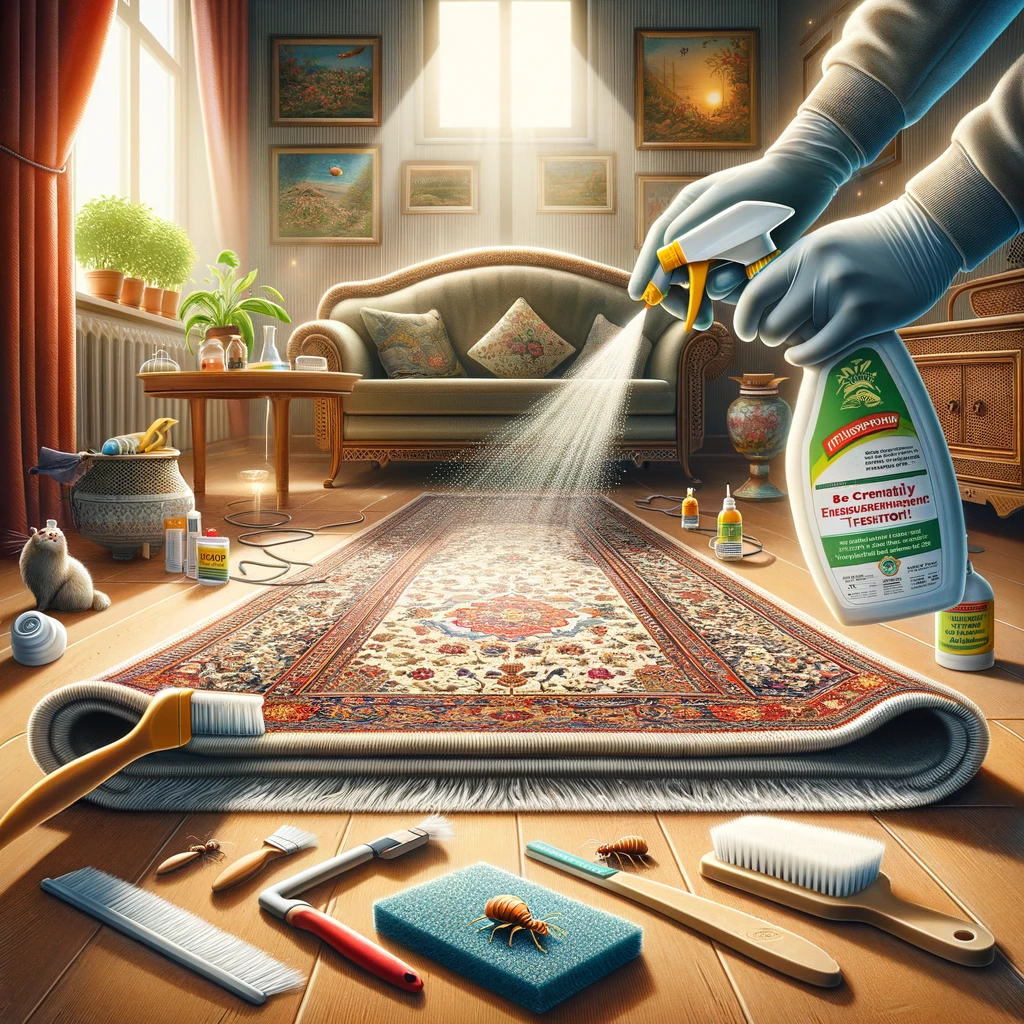
Joe Rugs - Carpet Expert
Hello! I'm Joseph Rugs, the founder of CarpetJoe.com and your guide through the intricate world of carpets. Born and raised in London with a deep-rooted passion for art and culture, I've explored the globe to bring the rich tapestry of carpet weaving right to your screen. My academic background in arts and humanities from Oxford has fueled my curiosity, leading me to uncover the stories behind every knot and weave. As a family man, my adventures are shared with my loved ones, enriching our lives with every piece of art we encounter. Join me as we explore the beauty and craftsmanship of carpets together.
Carpet Repair & Restoration Guides
Carpet damage can range from minor issues like small burns or stains to more significant problems such as large tears or widespread wear.
Identifying the type of damage is the first step in determining the most suitable repair method.
Master carpet repair with our guides. Learn about fixing burns, holes, and wear in carpets and rugs, including DIY patch repairs and professional restoration tips.
Frequently Asked Questions
Yes, white vinegar can effectively clean carpets. It helps remove stains and odors due to its natural acidic properties.
Combining vinegar and baking soda can effectively remove cat urine from carpets. The vinegar neutralizes the urine odor, while baking soda absorbs it.
Vinegar should be used cautiously on Persian rugs. Always perform a spot test first, as the acidity of vinegar might affect delicate fibers and dyes.
You can put vinegar on most rugs, but it's important to dilute it with water and do a spot test first to check for any adverse reactions.
Deep cleaning a Persian rug typically requires a gentle, pH-neutral detergent and water. Avoid harsh chemicals and consider professional cleaning for best results.
Vinegar can potentially discolor some rugs, especially those with delicate dyes. Always conduct a patch test before applying it broadly.
Vinegar might damage wool rugs by breaking down their natural oils. Use it sparingly and always test it on a small area first.
Avoid using vinegar on highly delicate fabrics, untreated wood, and marble. It can also be harmful to some wool rugs and silk carpets.
For cleaning purposes, letting vinegar sit on the carpet for 5-10 minutes is usually sufficient. Ensure thorough rinsing and drying afterward.
White vinegar typically does not stain rugs; however, it's always safe to do a spot test to ensure it doesn't affect the carpet's color.









